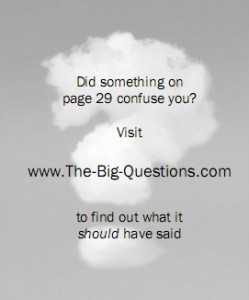Is it rational to play Megamillions, with the current jackpot of a billion dollars or so?
Yes and no. Here are three questions:
- Are you willing to pay $20 for ten MegaMillions tickets?
- Are you willing to pay $20 for seven weeks’ worth of immunity from fatal lightning strikes?
- I propose to flip a coin. Heads, you get the MegaMillions jackpot. Tails, you die. Do you want to play?
There is no irrational answer to any of these questions. Some people like to play the lottery; some don’t. Some people are safety fanatics; some aren’t. Some, but not all, love huge risks with huge potential payouts.
But there is such a thing as an irrational pattern of answers. I know there are millions who answer yes to question 1, because I see them buying tickets. I’m guessing that almost all of those people would answer no to question 2. And I’m guessing that a fair number of those would answer no to question 3 as well. Perhaps you”re one of that fair number. If so, I declare you irrational.
Ten Megamillions tickets give you about a one in thirty-million chance to win the jackpot. One in thirty-million is also pretty close to the chance you’ll be struck by lightning in the next seven weeks. If you’re willing to buy the lottery tickets but not immunity from the lightning, you’re telling me that winning the jackpot means more to you than staying alive. So you should go for the coin flip in question three. If you didn’t, I declare you irrational.
Well, so what? Some economist called you irrational. Why should you care?
You should care because this is exactly the kind of irrationality that will allow me to take all your money. Keep reading to see why.
But first, let’s acknowledge that I’ve ignored a few things, like the possibility that you’ll win one of the lesser prizes in the lottery. I’m assuming that, compared to the jackpot, those are negligible as reasons to buy a ticket. (This is consistent with the observed fact that a whole lot of people buy tickets only when the jackpot is large.) If you don’t like that assumption, we can avoid it by tweaking the numbers in the questions, in ways that I strongly suspect won’t change most people’s answers.
Now let’s get to the fun part where I take all your money. Suppose you’ve answered yes/no/no to the three questions above. Then I’ll rig up the following experiment: I fill a bag with 30 million white balls, one black ball, and one blue ball. I plan to pull a ball from the bag, but before I do, I’ll make you two offers. You can take them or leave them; it’s entirely up to you.
- A. If you give me $20 upfront, and if I draw the blue ball, I’ll give you a billion dollars.
- B. I’ll give you $20 upfront, provided you allow me to electrocute you if I draw the black ball.
You’ve already told me that you’d pay $20 for ten Megamillions tickets, giving you a one in thirty-million chance at roughly a billion dollars. So of course you’ll happily go for A. And you’ve already told you that it’s not worth it to you to give up $20 to avoid a one in thirty-million chance of electrocution. So of course you’ll also happily go for B.
So: You (voluntarily) give me $20 and accept my $20. So far we’re even. And, I might add, you’re very glad to be playing. You got two things and you wanted both of them.
Now the drawing. Most of the time I’ll draw a white ball, and nothing happens. But occasionally I’ll draw a blue or a black. When I do, I’ll tell you (perfectly honestly, because I’m honestly exploiting your irrationality, not trying to trick you) that I’ve drawn a non-white ball. There’s a fifty-fifty chance it’s black, in which case you will die, and a fifty-fifty chance it’s blue, in which case you win the billion. You are effectively facing the very coin flip that you told me in Question 3 that you prefer to avoid. Of course, then, you’ll gladly pay me a few bucks to call everything off. Now I’m ahead.
We might have to play this game several million times before I draw a non-white ball and take your money, but as long as you’re committed to your stated preferences, you should be willing to play several million times — or to let me set my computer to playing a virtual version for us several million times per hour. In a few hours, I’ll win some money from you. In another few hours, I’ll win more. And so on till you’re broke.
When an economist calls you irrational, it almost always means that if you follow through on your stated preferences, a sufficiently clever opponent can take all your money, leaving you smiling along the way. It’s worth being alert to such things.
If you thought this was fun, you should take the ten-question Irrationality Test in Chapter Six of Can You Outsmart an Economist?. Come back to the blog and let me know how you did.



 Doubly fortunately, I happened to pour out my woes to the brilliant psychometrician Ellen Julian, who suggested that we make up cards much like the one illustrated here and somehow get them into the tens of thousands of books that were scheduled to leave the warehouse the following Monday morning. (This was a Thursday.) The Free Press made it happen in a day, and all would have been well had I not awakened on Saturday to the sickening realization that the cards contained the wrong URL. Now it was the weekend and too late to have new cards made in-house.
Doubly fortunately, I happened to pour out my woes to the brilliant psychometrician Ellen Julian, who suggested that we make up cards much like the one illustrated here and somehow get them into the tens of thousands of books that were scheduled to leave the warehouse the following Monday morning. (This was a Thursday.) The Free Press made it happen in a day, and all would have been well had I not awakened on Saturday to the sickening realization that the cards contained the wrong URL. Now it was the weekend and too late to have new cards made in-house.
